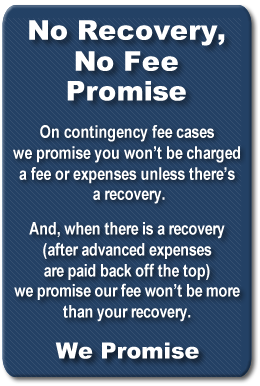North Carolina Workers’ Compensation FAQs
Question: What types of injuries are covered by workers’ compensation?
Answer: Most injuries suffered on the job while you are performing your work duties are covered under North Carolina workers’ compensation law (whether it is a cut, broken finger, broken back, occupational disease or death).
Question: Do I have to prove that my employer was at fault?
Answer: No. You do not have to prove that your employer was at fault to make a claim for benefits in North Carolina. You do have to show that your injuries arose in the course of your employment. In other words, if you were injured while doing something work related and during work hours, you are typically covered.
Question: What if my employer does not have workers’ compensation insurance?
Answer: You should make a report to the NCIC Fraud Section and, if injured, should file a Form 18 and Form 33 with the Commission. You can e-mail your completed Form 18 to forms@ic.nc.gov.
Question: What should I do if my employer refuses to report my injury?
Answer: You should file a claim (Form 18 or Form 18B) as soon as possible with the NC Industrial Commission. You can e-mail a completed form to forms@ic.nc.gov. Or you can contact an attorney to assist you.
Question: What if my employer simply refuses to acknowledge the claim?
Answer: You should hire an experienced workers’ compensation attorney. If a claim is ignored or denied by the insurance company, or self-insurer, the employee may request a hearing before the Industrial Commission by submitting a Form 33, Request for Hearing.
Question: If I file a claim for a work injury will I get fired?
Answer: It is illegal for an employer to fire you or retaliate against you for making a workers’ compensation claim. If your employer does fire you, it is a violation of the Retaliatory Employment Discrimination Act (REDA). For more information, go to the North Carolina Department of Labor website.
Question: How do I report a work injury and file a claim?
Answer: You should inform your immediate supervisor. If nothing happens, you should report your injury to your company's Human Resources Department. You should then file a claim (Form 18 or Form 18B) as soon as possible with the North Carolina Industrial Commission. You can e-mail a completed form to forms@ic.nc.gov. You have up to thirty days (30 days) to report your injury to your employer in writing, and you have two years to file a claim with the North Carolina Industrial Commission.
Question: Can I claim workers’ compensation benefits if I did something to cause my injury?
Answer: Yes. North Carolina workers’ compensation benefits are typically available even if you are at fault for the accident. There are several exceptions to this rule. For example, your claim can be denied if your work-related injuries are intentionally self-inflicted, or you are under the influence of drugs or alcohol at the time of the accident.
North Carolina Workers’ Compensation Wage Benefits Question: When do I become eligible for lost wage compensation?
Answer: Wage compensation is typically due after you have missed seven (7) days of work.
Question: How often are wage compensation payments made?
Answer: Wage payments are made typically made weekly.
Question: How much will I be paid?
Answer: In most cases, you are entitled to 2/3 of your average weekly wage per week. However, there are caps on weekly benefits.
Question: How long will I receive wage benefits?
Answer: Until you are able to return to work or you agree to a lump sum settlement with the workers’ compensation insurance carrier, which is required to be approved by the North Carolina Industrial Commission.
Workers’ Compensation Medical Care Benefits
Question: Do I have to go to the doctor that the insurance company chooses?
Answer: Yes. Your employers’ insurance company has the right to choose your physician. If you change physicians without going through the proper procedures, your medical expenses may not be paid. You can change physicians either by agreement with your employer, approval of the Industrial Commission or the physician the company sends you to refers you to another physician approved by the insurance company. An experienced workers’ comp attorney can help with changing your doctor.
Question: Can I see a Chiropractor?
Answer: Yes, if your employers’ insurance company gives permission to seek medical treatment from a chiropractor, you are entitled to 20 visits if medically necessary. If more visits are needed, your chiropractor should request authorization.
Question: Can I be reimbursed for having to travel to the doctor?
Yes, if you travel 20 miles or more round trip for medical treatment in workers’ compensation cases, you are entitled to reimbursement for mileage.
Question: What is permanent partial disability?
Answer: This is the total loss, or partial loss of use of a part of your body or inability to earn the same rate of pay in any other employment that you were earning at the time of injury.
Question: Who determines permanent partial disability?
Answer: The North Carolina Industrial Commission. It is based on the permanent impairment ratings of your doctor or other evidence of your earning capacity.
Hiring a North Carolina Workers’ Compensation Lawyer
Question: Do I need to hire an attorney if I am injured on the job?
Answer: If the injury is not serious, such as a minor injury where you only require medical treatment for a short period of time, do not miss work, fully recover and the claim is accepted as compensable, you may not need an attorney. You can also obtain a minimal degree of legal assistance through the North Carolina Industrial Commission. If, however, the injuries appear to be more serious, the claim is denied or you become overwhelmed with the process, it would be wise to at least consult an attorney. An attorney can be valuable in advising you of your rights, especially if your injuries are permanent and may prevent you from returning to the same employment or occupation. An attorney can also evaluate whether you have a claim against another third party.
Question: How much do I have to pay an attorney to handle my case?
Answer: Attorney fees in North Carolina workers’ compensation cases are generally contingent fees, based on a percentage of the benefits which the attorney obtains for you in a final settlement, also known as a lump sum settlement. The fees are typically 25% of an award or final recovery and must be approved by the North Carolina Industrial Commission.
If you have further questions, contact the workers compensation lawyers at the law firm of Hemmings & Stevens, PLLC for a free, no obligation consultation.











